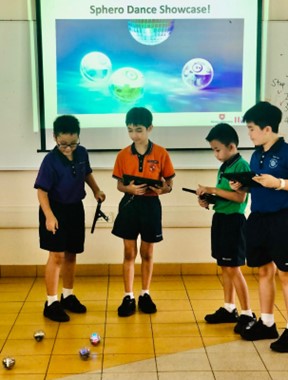Information & Communications Technology
Approach
Empowering Future-Ready Digital Learners at Meridian
At Meridian, we are committed to nurturing students who are digitally confident, responsible, and future-ready. In alignment with MOE’s EdTech Masterplan 2030, we adopt a whole-school approach to develop our students into 21st-century learners through a vibrant, ICT-enriched environment. Our ICT programme is anchored in four key strands that support learning and teaching:
1. Strand 1: ICT Curriculum, Pedagogy & Assessment
We deepen the use of ICT in the classroom, designing engaging, student-centred lessons that foster creativity, critical thinking, and collaboration.
2. Strand 2: Student ICT Capacity Building
We build our students' digital literacy and technological skills in line with 21st Century Competencies. We also cultivate Cyber Wellness by guiding students to use ICT safely, ethically, and responsibly.
3. Strand 3: Teacher ICT Professional Development
Our teachers are supported and encouraged to design tech-enabled learning experiences. We promote a culture of collaboration and professional sharing to enhance teaching with technology.
4.Strand 4: Systems Support
We ensure the seamless integration of ICT through a well-supported digital infrastructure that enhances both teaching and learning, as well as administrative efficiency.
Key Departmental Programmes
1. Student ICT Capacity Building
Taking reference from MOE’s Guide to the Development of Digital Literacy and Technological Skills, Meridian designs a holistic programme to develop our students’ digital competencies. This is aligned with the nine Digital Competencies (DCs) that scaffold students’ growth in becoming digitally literate learners.
We adopt a Just-in-Time learning approach, ensuring students learn digital skills in authentic contexts using real-world tools and platforms. Across departments, ICT skills are infused into the Total Curriculum, enabling meaningful integration across all subjects. These include:
• Microsoft Office Tools – Word, PowerPoint, Excel
• Computational Thinking & Coding – through the Code for Fun programme
• Digital Creativity & Art – using tools such as Sketchbook Pro
2. Cyber Wellness: A Balanced and Responsible Digital Life
Digital fluency goes hand-in-hand with digital citizenship. At Meridian, we embed Cyber Wellness education into our curriculum to help students understand the importance of balance, responsibility, and respect in the digital space.
Cyber Wellness Ambassadors
Selected students are empowered to be Cyber Wellness Ambassadors, leading peer advocacy efforts to promote safe and responsible digital behaviour. These student leaders are equipped through structured training and supported by dedicated teachers.
Partnering Parents for Cyber Wellness
We believe that strong partnerships with parents and guardians reinforce our Cyber Wellness message at home. We encourage families to:
• Model good digital habits
• Maintain balance between screen time and offline life
• Use ICT positively and purposefully
• Foster a respectful and safe online presence
By working together, we ensure a consistent and coherent approach to Cyber Wellness education.
Highlights
2025
Code for Fun (CFF) for Primary 4
This year, we introduced the Code for Fun programme to our Primary 4 students, paving the way for their progression into the AI for Fun programme in Primary 6 by 2027.
During the CFF programme, students had a blast exploring:
• Computational thinking skills
• Hands-on coding and robotics projects
• Emerging technologies, including Artificial Intelligence
This early exposure not only strengthens their tech foundation but also inspires a passion for innovation and problem-solving.
 |
 |
For enquiries on the school’s ICT Department, please email:
Mr Lee Huan Leng (Head of Department)

